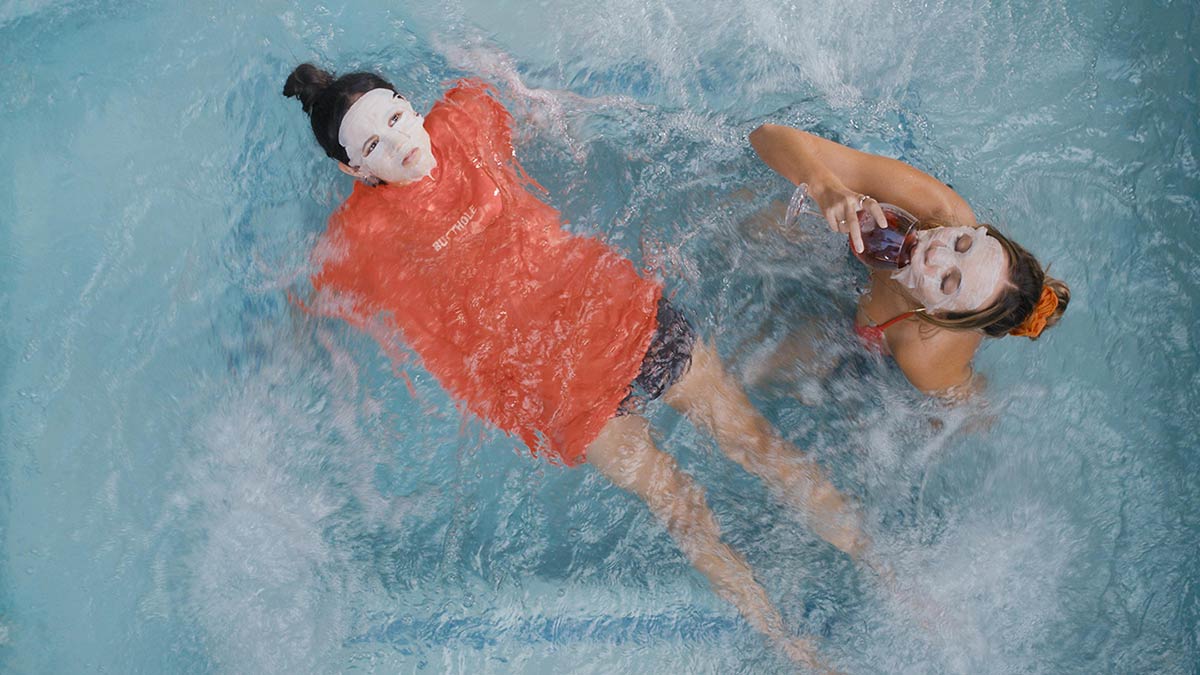A teenage Vada (Jenna Ortega) arrives at her high school with her best friend Nick (Will Ropp). The coarse Vada isn’t part of the in-crowd. She sports oversized t-shirts, basketball shorts, and sneakers. She leaves during class, skittering to the bathroom to take a phone call from her younger sister Amelia (Lumi Pollack). There she crosses paths with Mia Reed (Maddie Ziegler) — a popular arresting dancer on Instagram now contouring in the mirror for picture day. Bang — Scream — “Is that a gun?” Vada pulls Mia into the nearest stall. — There is a school shooting.
READ MORE: The 100 Most Anticipated Films Of 2021
So opens, in startling, frightening detail, Megan Park’s directorial feature debut “Fallout.” A melodramatic character study whose treacle temperament renders the aftermath of a school shooting powerfully yet strained.
READ MORE: The 25 Best Films Of 2020
The film’s intensity, of course, begins in the tragedy itself. Once Vada pulls Mia into the stall, the two girls crouch atop the toilet. They hold their muffled cries as the peals of gunfire shred the air. Cinematographer Kristen Correll loves overhead shots. In a scene where we never see the shooter, but we hear their indiscriminate destruction, the viewpoint’s distance makes for a distressing sequence. A sequence that finds another layer when a frightened Quinton (Niles Fitch) scrambles into an adjacent stall for safety.
READ MORE: The Best Documentaries Of The Decade [the 2010s]
While this trio makes up the heart and psychological interest of the narrative, the primary engine is Vada. In the days following the shooting, the once talkative 16-year old becomes detached from her mother (an understated Julie Bowen), her father (John Ortiz), precocious kid sister, and her best friend Nick — who ala the Parkland survivors, becomes an activist to combat lax gun laws. The only bonds Vada keeps are the new ones she forms with Mia and Quinton. Mia, especially, who lives alone in a luxe home while her fathers travel for business, becomes a refuge for Vada.
See, “The Fallout” is as much about Vada discovering others as it is about the teen rediscovering herself. Contrary to the two girls’ disparate appearances — Vada’s attire is typically slapdash while Mia looks as though she’s always primed for an Instagram selfie — beyond this event, they share quite a few commonalities. And in their tender hangout sessions, they gorge themselves on wine and weed and lean on each other for support. While it’s fun for both, they’re both emotionally hemorrhaging.
“The Fallout” is equally about Vada facing that truth. For instance: Her mom sends her to a therapist (Shailene Woodley) for help. There, Vada deflects the toughest questions by way of her rough humor. Ortega is masterful at selling the sharp one-liners that precede the tears. Even so, sometimes, when the false exterior gives way to her character’s buried heartache, the young actress does telegraph her choices. But in a film she must carry, the infrequent slip-ups do little to tarnish the enormity of the performance.
The other key to “The Fallout” is how it intimately portrays Vada’s distance. In this sense, Correll doesn’t just rely on overhead shots. She employs a deep depth of field mixed with low idiosyncratic angles that take in the frame’s full negative space. The results make us as fully aware of the rooms these teens inhabit as the teens themselves. Because in the aftermath of a tragedy, one can’t help but be wary of even the quiet, empty corners.
These aesthetics set-up the teens’ later spirals: Drug use increases, they become more withdrawn from their families, and they experience sexual awakenings—all of them except Quinton. The star of “This Is Us,” Fitch doesn’t garner as much screen time as Ortega or Ziegler, but his even-keel beguiling presence adds easeful contours to this, at times, wispy melodrama. In fact, there’s a scene where Vada asks Quinton about the younger brother he lost in the shooting. It’s a robust moment, brimming with pathos, not because Fitch resorts to tears, but because he withholds them. It’s the type of sequence where you know you’re watching a special performer.
One will probably wish “The Fallout” showed more of that restraint. It can get mired in the waterworks and ring falsely in artifice when it finally does take some uplifting swings. But these young performers are always true to themselves. Honest and bare without inhibitions. Which is fitting for a movie that’s about rebuilding oneself and one’s connections to the world by telling yourself that the pain is okay. The hurt is real. And the love we give never dies. Park’s “The Fallout” is a resilient character study of grief in all its forms. [B]
You can follow along with the rest of our 2021 SXSW coverage here.





